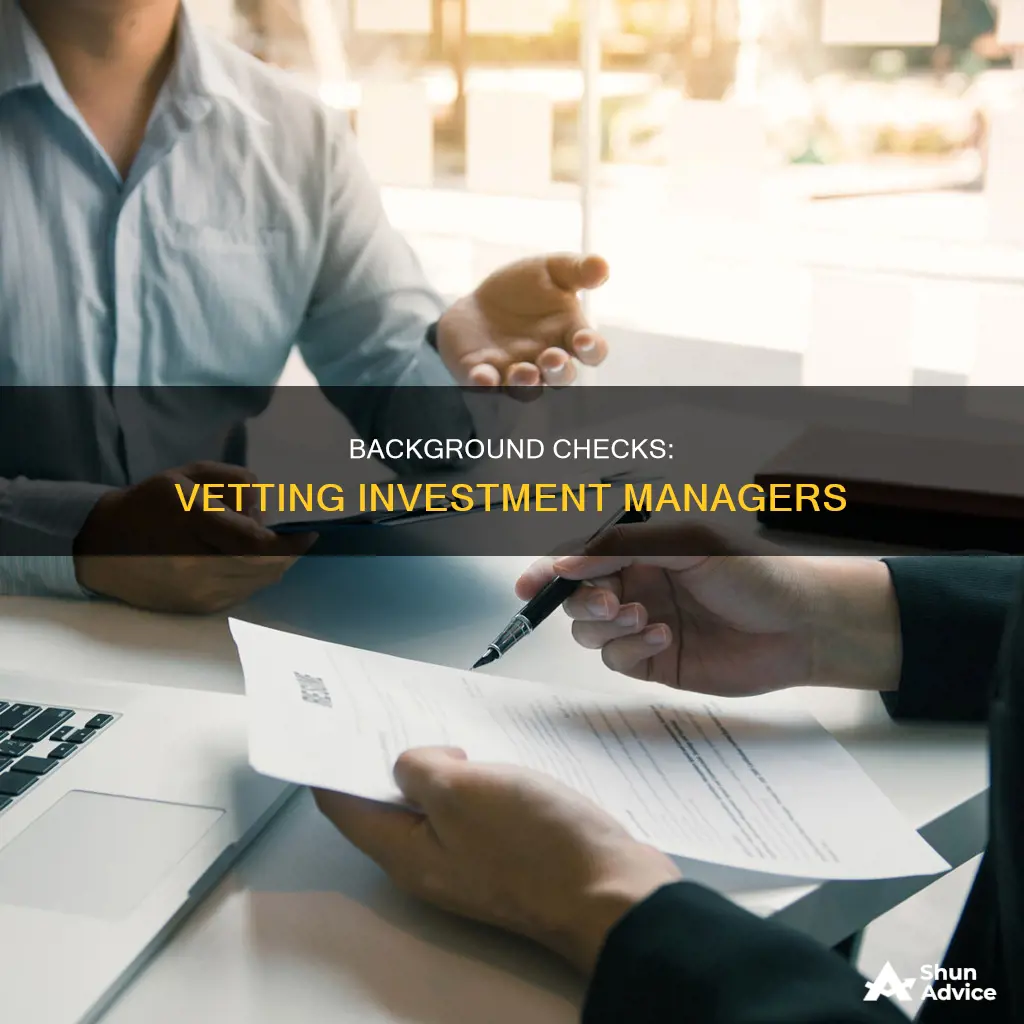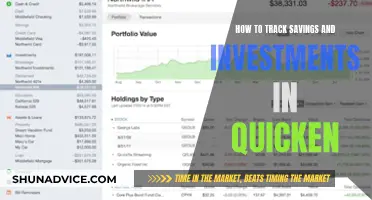
Background checks are an important tool for investors to manage risk and ensure that fiduciary allocations are made to trustworthy and reliable individuals. They are also useful for preventing financial losses and legal battles, safeguarding company reputation, and preventing security breaches. These checks are particularly crucial for financial institutions that handle sensitive information and large sums of money. Background checks can reveal red flags related to criminal history, financial regulatory compliance, credit history, and employment history, among other things. They can also help verify the identity and credentials of investment managers.
| Characteristics | Values |
|---|---|
| Purpose | To avoid scams, conflicts of interest, legal issues, and misaligned expectations |
| Tools | Crunchbase, PitchBook, AngelList, LinkedIn, Google, social media, free search tools on Investor.gov, FINRA's BrokerCheck program, state securities regulator, VerifyInvestor, AngelList Verify |
| Information Gained | Criminal history, identity verification, qualifications, employment history, lawsuits, arbitrations, regulatory actions, employment terminations, bankruptcy filings, customer complaints |
What You'll Learn

Verify identity and credentials
Verifying the identity and credentials of an investment manager is an important step in conducting a background check. This process helps to ensure that the individual is who they say they are and that they have the necessary qualifications and experience to provide investment advice. Here are some steps to verify the identity and credentials of an investment manager:
- Use online tools: Utilise online platforms such as LinkedIn, Google, or social media to search for the investment manager's profile, background, and network. This can help corroborate information about their professional activities, accomplishments, and any potential red flags.
- Contact information: Request their official email address, phone number, or website to further confirm their legitimacy.
- Accreditation status: Check their accreditation status, which indicates that they have met certain criteria to invest in private companies. Platforms like VerifyInvestor or AngelList Verify can be used for online verification of their accreditation.
- Professional qualifications: Review their professional qualifications, such as licenses, certifications, or degrees, to ensure they have the necessary expertise in the field.
- Employment history: Verify their employment history and experience by contacting their previous employers or referencing their resume or CV.
- References: Contact their provided personal and professional references to gain additional insights into their character, work ethic, and qualifications.
- Government registries: Check government registries, such as investor advisory websites or securities regulators, to ensure the investment manager is registered, licensed, and in good standing.
By following these steps, you can verify the identity and credentials of an investment manager, ensuring they are qualified and legitimate. This process helps protect yourself from potential scams, conflicts of interest, or misaligned expectations.
Understanding Management Fees: Initial Investment Charges
You may want to see also

Check for criminal records
Background checks are a crucial step in hiring investment managers, especially in the financial industry, where large sums of money and sensitive information are involved. Criminal history checks are a vital component of these background screenings, helping to ensure that individuals with a history of financial crimes or dishonesty are not placed in positions where they can cause harm.
Criminal record checks are essential to prevent fraud, embezzlement, and other financial crimes. These checks aim to verify that individuals seeking employment in the financial sector do not have a history of dishonest or criminal financial dealings. By conducting these screenings, employers can reduce the risk of potential candidates engaging in illegal or unethical behaviour that could lead to financial losses and damage the institution's reputation.
The process of checking criminal records typically involves requiring applicants to submit a clearance from a government body, such as the police or a national investigation agency. However, access to government databases varies across countries, and in some cases, employers may need to partner with background screening agencies to obtain this information.
The scope of the criminal history check includes verifying the absence of theft, fraud, embezzlement, or any other financial crimes in the candidate's past. This process can take anywhere from a few days to a few weeks, depending on the country and the methods used to obtain the information.
In addition to criminal history checks, other components of a comprehensive background check for investment managers include verifying adverse financial history or credit checks, employment history, education history, and personal identification information. These checks provide a holistic view of the candidate's integrity, reliability, and suitability for a role in the financial industry.
Maximizing Your Extra Savings: Smart Investment Strategies
You may want to see also

Assess their fit and alignment
When assessing the fit and alignment of an investment manager, it is crucial to evaluate their compatibility with your venture and your shared vision, mission, and values. Here are some key considerations:
- Investment thesis, criteria, and expectations: Understand their investment strategy, including their thesis, focus, and stage of investment. Evaluate how their criteria and expectations align with your stage, sector, and goals.
- Communication and collaboration: Ask questions about their communication style and level of involvement. Understand how they collaborate with founders and their portfolio companies, especially during challenging times.
- Value-add beyond capital: Look beyond just financial investment. Assess the strategic advice, connections, and support they can offer.
- References and testimonials: Check references from current and past portfolio companies. Speak to founders and CEOs who have worked with them to gain insights into their experiences.
- Network and team: Get to know the investor's team, partners, associates, analysts, and advisors. Building a rapport with them is essential, as they will be your connection to the investor.
- Exit strategy: Understand the investor's exit strategy and how it aligns with your long-term goals.
- Due diligence: Conduct thorough due diligence by asking probing questions and speaking to different people in the ecosystem, including competing funds, portfolio companies, advisors, and limited partners.
- Negotiation: Pay attention to how they negotiate and handle disagreements during the terms negotiation process. This will give you insights into their true nature and how they will treat you as a partner.
- Online presence and reputation: Review their online profiles, such as LinkedIn, Twitter, or personal websites. Look for any negative reviews, complaints, or lawsuits filed against them.
Kids' Guide to Saving and Investing Wisely
You may want to see also

Check their track record
When it comes to investing, it's crucial to do your due diligence on investment managers by checking their track record. This involves verifying their historical performance and returns to ensure they are legitimate and capable of delivering strong results. Here are some detailed steps to guide you through the process:
- Review their historical performance data: Request a summary of the investment manager's historical performance, verified by an independent accountant. This summary should include the accountant's report, a tabular format of performance records, and supporting notes explaining the return calculation methodology. This provides insight into the investment manager's strategy and results over time.
- Analyse their investment strategy and returns: Dig into the specifics of their investment approach. How much have they invested, and in which sectors or industries? What have been the returns on these investments? Are there any notable successes or failures? Understanding these details will give you a clearer picture of their expertise and the value they can bring.
- Examine their portfolio companies: Look into the companies they have invested in. Are these companies successful and established? Are they startups with potential? Evaluating the quality of their investments can provide insight into the investment manager's ability to identify promising opportunities.
- Seek testimonials, reviews, and referrals: Reach out to other founders or investors who have worked with the investment manager. Their first-hand accounts can offer valuable insights into the investment manager's reputation, reliability, and the value they added to previous ventures.
- Consider their alignment with your goals: While checking their track record, assess whether their investment strategy aligns with your own goals and risk tolerance. Do they have experience in the specific sector or industry you are targeting? Are they comfortable with the investment size you have in mind? Choosing an investment manager with a successful track record in your desired sector increases the likelihood of a successful partnership.
Remember, checking an investment manager's track record is a critical step in making informed decisions about your financial future. It ensures that you select a reputable and qualified professional who aligns with your investment goals and can help you build wealth effectively.
Diversification: Saving and Investing's Best Friend
You may want to see also

Review terms and conditions
Before signing any term sheet, it is crucial to review the terms and conditions of the investment offer. This involves carefully scrutinizing the document to understand the implications of each term and how it will impact your control, ownership, and future fundraising prospects.
- Valuation: Understand how the investor has valued your company and whether this valuation aligns with your expectations and market standards.
- Equity: Determine how much ownership or stake in your company the investor will receive in exchange for their investment.
- Dilution: Consider the potential impact on your ownership stake over time, especially if multiple rounds of investment are involved.
- Voting rights: Assess the level of control and decision-making power the investor will have in your company.
- Board representation: Evaluate the investor's role in your company's board of directors and how this may influence strategic decisions.
- Exit clauses: Understand the conditions under which the investor can exit the investment, including any potential triggers for forced exit or buyback options.
It is advisable to consult with a lawyer or a trusted advisor to help you navigate the legal and financial complexities of the terms and conditions. They can provide valuable insights and ensure your interests are protected.
Additionally, be cautious of potential red flags or deal-breakers in the terms and conditions, such as:
- Unrealistic or unreasonable valuation or equity demands.
- Excessive or hidden fees and charges.
- Inflexible or unfavorable terms or clauses.
- Lack of transparency or disclosure.
- Pressure or urgency to close the deal without proper due diligence.
Remember, the devil is in the details, and a thorough review of the terms and conditions is essential to safeguard your interests and make informed decisions about the investment offer.
Private Equity: An Investment Management Strategy?
You may want to see also
Frequently asked questions
Background checks are important for investment managers as they help to mitigate the risk of fraud and financial mismanagement. They also ensure the integrity and trustworthiness of employees handling sensitive financial information and large sums of money.
The key types of background checks for investment managers include financial regulatory checks, credit checks, employment history checks, education verification, and criminal history checks.
There are several tools and databases available to conduct background checks on investment managers. For example, in the US, Investor.gov provides a free search tool to check the registration status and background of financial professionals. FINRA's BrokerCheck tool allows individuals to research whether an investment advisor is registered and licensed. The Investment Adviser Public Disclosure (IAPD) website also provides detailed information on investment advisors, including employment history, licensing information, and disciplinary actions.







